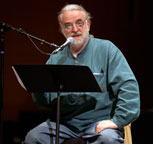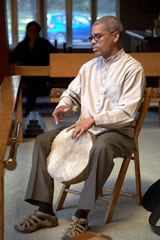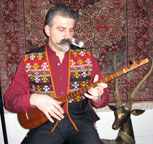NYS WRITERS INSTITUTE
HOME PAGE

CELEBRATING 25 YEARS OF LITERATURE
 "RUMI AND THE WHIRLING DERVISHES,” A PROGRAM CELEBRATING THE POETRY OF MEDIEVAL ISLAMIC MYSTICAL POET RUMI IN WORDS, MUSIC AND DANCE
"RUMI AND THE WHIRLING DERVISHES,” A PROGRAM CELEBRATING THE POETRY OF MEDIEVAL ISLAMIC MYSTICAL POET RUMI IN WORDS, MUSIC AND DANCE
NYS Writers Institute, October 21, 2009
7:30 p.m. Reading/Performance | Recital Hall, Performing Arts Center, Uptown Campus
CALENDAR LISTING:
“Rumi and the Whirling Dervishes,” an event that will feature the poetry of renowned 13th century Sufi mystic Jelaluddin Rumi, as well as highly kinetic Sufi dance and medieval Turkish and Persian music, will be presented on Wednesday, October 21, 2009 at 7:30 p.m. in the Recital Hall, Performing Arts Center, on the University at Albany’s uptown campus. Admission is free and open to the public, but a ticket must be obtained from the Performing Arts Box Office at 442-3997 or [email protected]. The event is sponsored by UAlbany’s Office of International Education, the Performing Arts Center and the New York State Writers Institute.
PROFILE
 “Rumi and the Whirling Dervishes” is a program that presents the poetry of renowned 13th century Sufi mystic Jelaluddin Rumi, accompanied by highly kinetic Sufi dance and medieval Turkish and Persian music. Performers will recite and sing Rumi’s sacred poems in both English and Farsi, the language of ancient Persia and modern Iran. The event has previously been staged at the Metropolitan Museum of Art and the National Cathedral.
“Rumi and the Whirling Dervishes” is a program that presents the poetry of renowned 13th century Sufi mystic Jelaluddin Rumi, accompanied by highly kinetic Sufi dance and medieval Turkish and Persian music. Performers will recite and sing Rumi’s sacred poems in both English and Farsi, the language of ancient Persia and modern Iran. The event has previously been staged at the Metropolitan Museum of Art and the National Cathedral.
Best known for ecstatic poems that celebrate the love between God and humankind, Rumi’s work is revered by spiritual seekers from all faiths and backgrounds. Born in 1207 in the city of Balkh in modern day Afghanistan, Rumi fled with his family eastward to escape an impending Mongol invasion, and eventually settled in the Turkish city of Konya, the capital of the Seljuk empire. He grew up under the tutelage of his father, an eminent Sufi mystic, and his acolytes. Like his father, he developed into a renowned scholar, jurist, theologian, and head of a madrassah in Konya. A meeting with the dervish (“wandering ascetic and mystic”) Shams-e-Tabrīzī inspired Rumi to pursue more ecstatic and musical expressions of piety.
After the death of Shams, the grief-stricken Rumi composed poetry extemporaneously, claiming that the spirit of Shams spoke these poems directly through him.
 Rumi also founded the Mevlevi Order of Sufi Islam, known for its practice of whirling dance as a form of religious devotion, which many regard as an essential complement to Rumi’s poetical work.
Rumi also founded the Mevlevi Order of Sufi Islam, known for its practice of whirling dance as a form of religious devotion, which many regard as an essential complement to Rumi’s poetical work.
The English reader will be Peter Rogen, founder of the Poetry of Rumi performance troupe, who is also a trained Shakespearian actor (formerly with the Helen Hayes Equity Theatre). Presentations of the Poetry of Rumi troupe— praised for their authenticity as much as their breathtaking beauty— have been underwritten by the International Mevlana Foundation of the Mevlevi Sufi order, and by the Office of the Mayor of Rumi’s home city of Konya in Turkey.
Rumi’s poetry has exerted a profound influence on the literature of Central Asia, the Arab world, and the Indian subcontinent. In modern times, it has attracted numerous devotees throughout the Western world. In 2007, a BBC News feature proclaimed Rumi the “most popular poet in America” based on book sales.
For additional information, contact the Writers Institute at 518-442-5620 or online at https://www.albany.edu/writers-inst.